James-Alexandre de Pourtalès
James-Alexandre de Pourtalès, Comte de Pourtalès-Gorgier (28 November 1776 – 24 March 1855) was a Swiss-French banker, diplomat and art collector.
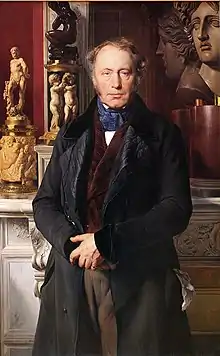
Early life
The Count de Pourtalès was born in Neuchâtel, then in the Principality of Neuchâtel under Prussian rule, into a large family of Protestant financiers on 28 November 1776.[1] He was the son of Countess Rose Augustine Marie de Luze (1751–1791) and Jacques-Louis de Pourtalès (1722–1814),[2] a banker in Naples who amassed a fortune in commerce and was made a count by King Frederick William II.[3] Among his siblings were Louis de Pourtalès (husband of Sophie d'Audanger) and Frédéric de Pourtalès (husband of Marie Louise de Castellane and grandfather of Friedrich von Pourtalès).[4]
His paternal grandparents were Jérémie de Pourtalès[5] and Marguerite de Luze (who was the younger sister of his maternal great-grandfather).[5] The Pourtalès family were French Huguenots who settled in Neuchâtel following the revocation of the Edict of Nantes in 1685.[4] His maternal grandparents were the former Marianne-Françoise Warney (a niece of Daniel Roguin of Yverdon)[6] and Baron Jean-Jacques III de Luze, a prosperous textile manufacturer at Colombier and were both friends of writer and philosopher Jean-Jacques Rousseau.[7][lower-alpha 1]. They had an elegant country house near the governor's château in what was then the principality of Neuchâtel.[8]
Career

In 1813, he acquired the seigneury of Gorgier, which he added to the family name, from Charles Henry, Vicomte de Gorgier.[lower-alpha 2][10][11] He served as Chamberlain to the King of Prussia and was awarded the title of Count on 20 November 1814 by King Frederick William III, who ruled Prussia during the Napoleonic Wars and the end of the Holy Roman Empire.[1] Pourtalès freed the Bérochaux from cartage chores in 1822 and, in recognition, received a bench with his coat of arms at the church. From 1816 to 1829, he was a member of the General Audiences.
Residences and art collection
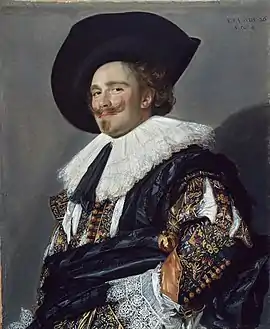
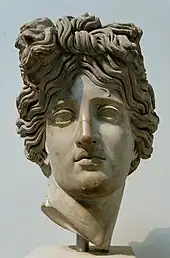
In 1815, he settled in Paris before residing in a mansion in the Place Vendôme in the 1st arrondissement of Paris.[3] Between 1838 and 1839, Pourtalès had Félix Duban build the Pourtalès mansion, a hôtel particulier (essentially a grand townhouse) on Rue Tronchet in the 6th arrondissement of Lyon. At his mansion, Pourtalès assembled one of the most important collections of antiques and paintings of his time, including the Laughing Cavalier by Frans Hals and works by Bronzino, Rembrandt, Jean-Auguste-Dominique Ingres and a Sandro Botticelli portrait.[12] In 1825, he donated a mummy and coffin he acquired from the Thedenat-Duvent sale, to the Berlin Museum. In February and March 1865, ten years after his death, his collection was auctioned off in Paris in accordance with his will. The majority of his collection was photographed and published in a large folio by Goupil & Cie. The Laughing Cavalier was purchased by the Marquess of Hertford (who outbid Baron de Rothschild). Lord Amherst bought some of the important Egyptian objects. Sir Charles Newton spent 60,919 francs on bronzes and vases for the British Museum, and 47,000 francs on Giustiniani's Apollo.[1]
In 1806, he purchased the Château de Bandeville in Saint-Cyr-sous-Dourdan where, in 1833, he had the English-style park redeveloped by landscape designer Louis-Sulpice Varé, in one of the first known works. Today, Varé is known for his French landscape gardens at several famous chateaux, including the Château de Châtenay-en-France, and the Bois de Boulogne park.[13]
In 1809, he also acquired Château de Luins in the Swiss Canton of Vaud for 150,000 Swiss francs. The estate passed to his eldest daughter and her husband, the Marquis de Ganay, and their family.[14]
Personal life
On 12 June 1809, he was married to Anne Henriette de Palézieux-Falconnet (1792–1836) in Neuchâtel. His wife was a daughter of banker Jean Louis de Palézieux-Falconnet and the former Anna Hunter, an American who was the sister of William Hunter, a U.S. Senator from Newport, Rhode Island. His wife's sister, Eliza Augusta, married the American archeologist and artist John Izard Middleton.[15] Together, they were the parents of:[4]
- Élisa Calixte de Pourtalès (1810–1877), who married diplomat Charles-Alexandre, Marquis de Ganay (1803–1881), son of Gen. Antoine-Charles de Ganay, in 1831.[4]
- Cécile de Pourtalès (1812–1833), who married Rodolphe Émile Adolphe de Rougemont (1805–1844) in 1830.[4]
- Henri de Pourtalès-Gorgier (1815–1876), who married Anne Marie d'Escherny (1820–1901) in 1840.[4]
- Charles de Pourtalès (1816–1871).[4]
- Jacques-Robert de Pourtalès (1821–1874), a French politician who married Adèle Anna Hagermann (1825–1898), a daughter of Swedish banker Jonas-Philip Hagerman, in 1846.[4]
- Edmond de Pourtalès-Gorgier (1828–1895), who married Mélanie Renouard de Bussière (1836–1914), a lady-in-waiting to Empress Eugénie, wife of Napoleon III.[4]
Count de Pourtalès died on 24 March 1855.[16]
Descendants
Through his eldest daughter Élisa, he was a grandfather of General Jacques de Ganay (1843–1899), who married Renée de Maillé de La Tour-Landry, the third daughter of Jaquelin Armand Charles, Duc de Maillé (son of the Duke and Duchess of Maillé) and his wife Jeanne d'Osmond (daughter of Gen. Rainulphe d'Osmond).[17]
Through his son Henri, he was a grandfather of Count Arthur de Pourtalès (1844–1928), a diplomat who twice married Americans.[18]
.png.webp) His father, Jacques-Louis de Pourtalès.
His father, Jacques-Louis de Pourtalès. Portrait of his parents and family, c. 1784.
Portrait of his parents and family, c. 1784.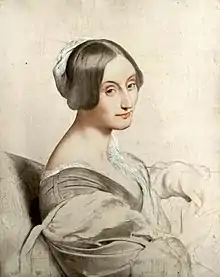 His daughter, Élisa, Marquise de Ganay, c. 1830.
His daughter, Élisa, Marquise de Ganay, c. 1830.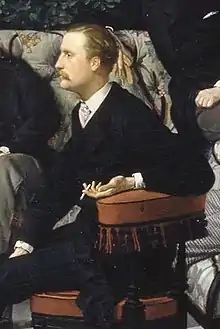 His son-in-law, Charles-Alexandre, Marquis de Ganay, by James Tissot, 1868.
His son-in-law, Charles-Alexandre, Marquis de Ganay, by James Tissot, 1868. His son, Edmond de Pourtalès, c. 1871.
His son, Edmond de Pourtalès, c. 1871.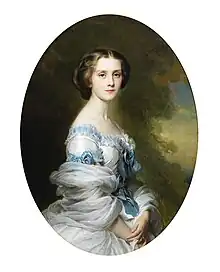 His daughter-in-law, Mélanie de Bussière, by Franz Xaver Winterhalter, 1857.
His daughter-in-law, Mélanie de Bussière, by Franz Xaver Winterhalter, 1857..jpg.webp) His grandson, Général Jacques de Ganay.
His grandson, Général Jacques de Ganay.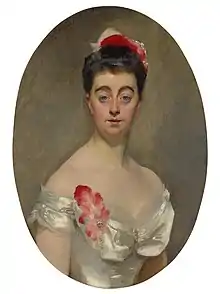 Portrait of his grandson's wife, Renée, the Countess de Ganay, by John Singer Sargent, 1885.
Portrait of his grandson's wife, Renée, the Countess de Ganay, by John Singer Sargent, 1885.
See also
References
- Notes
- The philosopher Jean-Jacques Rousseau described his grandfather, Jean-Jacques de Luze, whom he had been friends with for many years, as "having a cold manner but a warm heart."[7]
- In 1831, Pourtalès, as the Lord of Gorgier, ceded his jurisdiction to the sovereign, keeping the château as a fief and various properties that depended on it. Pourtalès' eldest son Henri de Pourtalès-Gorgier succeeded his father and was the last Lord of Gorgier. In 1848, he entered into an arrangement with the government at the time of the founding of the Republic, concerning certain seigneurial rights which had been reserved during the direct meeting in 1831. The Pourtalès family sold the Château de Gorgier to Alphonse Berthoud in 1879.[9]
- Sources
- "Comte James Alexandre de Pourtalès-Gorgier | Collections Online". www.britishmuseum.org. British Museum. Retrieved 9 May 2020.
- Schelbert, Leo (2007). Historical Dictionary of Switzerland. Scarecrow Press. p. 243. ISBN 978-0-8108-6447-4. Retrieved 9 May 2020.
- "Pourtalès-Gorgier, James-Alexandre, Comte de". doi.org. Grove Art Online, Oxford University Press. 2003. doi:10.1093/gao/9781884446054.article.T069086.
- Lehr, Ernest (1870). L'Alsace Noble (in French). p. 52. Retrieved 9 May 2020.
- Hennezel, Béat de (2009). J'ai retrouvé les bergers de Virgile: un architecte vaudois en Italie, 1792–1796 (in French). Editions d'en bas. p. 328. ISBN 978-2-8290-0374-5. Retrieved 9 May 2020.
- Ball, Terence (1998). Rousseau's Ghost. SUNY Press. p. 128. ISBN 978-0-7914-3934-0. Retrieved 9 May 2020.
- Damrosch, Leo (2007). Jean-Jacques Rousseau: Restless Genius. Houghton Mifflin Harcourt. p. 534. ISBN 978-0-618-87202-2. Retrieved 9 May 2020.
- Cranston, Maurice (1997). The Solitary Self: Jean-Jacques Rousseau in Exile and Adversity. University of Chicago Press. p. 24. ISBN 978-0-226-11865-9. Retrieved 9 May 2020.
- "Neuchatel: Le chateau de Gorgier". www.swisscastles.ch. Retrieved 9 May 2020.
- Knapp, Charles (1904). Geographisches Lexikon der Schweiz (in German). Gebr. Attinger. p. 373.
- Knapp, Charles (1903). Dictionnaire géographique de la Suisse (in French). Attinger frères. p. 341. Retrieved 9 May 2020.
- "Pourtalès, James Alexandre de". hls-dhs-dss.ch (in French). Dictionnaire Historique de la Suisse. Retrieved 9 May 2020.
- "Château de Bandeville". polytechnique.edu. Bibliothèque Centrale de l'École Polytechnique. Retrieved 9 May 2020.
- "L'histoire du Château – Chateau de Luins". chateaudeluins.ch (in French). Chateau de Luins. 26 April 2017. Retrieved 9 May 2020.
- Middleton, John Izard; Robertson, Lynn (1997). The Roman Remains: John Izard Middleton's Visual Souvenirs of 1820–1823, with Additional Views in Italy, France, and Switzerland. University of South Carolina Press. p. 11. ISBN 978-1-57003-169-4. Retrieved 9 May 2020.
- Boisset, Olivier Les antiques du comte JA de PG: une introduction, in Monica Preti-Hamard & Philippe Sénéchal (eds), Collections et Marché de l'Art en France 1789-1848, Rennes 2005.
- "JOHN SINGER SARGENT 1856 – 1925 MADAME LA COMTESSE JACQUES DE GANAY". sothebys.com. Sotheby's. Retrieved 9 May 2020.
- Depew, Chauncey M. (2013). Titled Americans, 1890: A list of American ladies who have married foreigners of rank. Bloomsbury Publishing. p. 190. ISBN 978-1-78366-005-6. Retrieved 10 May 2020.